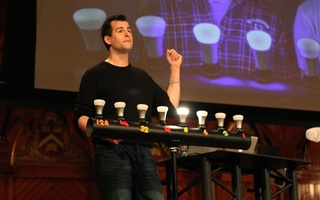In fact, he says widespread knowledge of the course's plagiarism software might actually ensure that fewer students get a little help from their friends on CS50 assignments.
The Invisible Hand
The software, which was developed several years ago by a graduate student in computer science, has since been maintained and used annually as a computer aid to detect cheating.
The program compares assignments with each other and with work handed in for previous years and computes a similarity score. Human TFs can then examine very similar papers more closely.
Beyond these sketchy details, the software remains shrouded in mystery--Sheiber insists the program's secrecy is "part of the effectiveness of the software."
A silent step along the grading process, few undergraduates ever feel its presence.
Undergraduate TFs, for example, are never allowed to deal with the software themselves, according to Michael W. Bodell '00, who was a teaching fellow for the course for its last two terms.
Read more in News
Gore, Bush Seal Nominations With Huge WinsRecommended Articles
-
Cut And Paste, Catch CheatersThe Internet has become the answer to cheaters’ prayers, diminishing any chance that professors might have to identify plagiarized source
-
Fighting Plagiarism, Schools Go High-TechWhat makes Kaavya Viswanathan ’08 unusual is not the fact that she plagiarized passages from another author’s work—it’s the fact
-
Pilot Program Takes Aim at PlagiarismInstructors in one sociology course will use anti-plagiarism software to catch copycats in their class, as part of a new
-
Professors Ask Computers to Catch CheatingProfessors are more widely employing algorithms, from decades-old codes to ones created by instructors, as an automated means to detect plagiarism in student assignments.
-
 Under CS50 Policy, Accused Students Likely Left in Dark
Under CS50 Policy, Accused Students Likely Left in Dark













